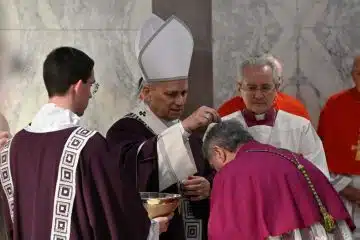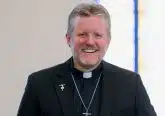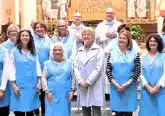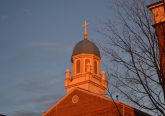UD’s Osher Institute offers opportunities for enrichment, fun
May 6, 2009
By Eileen Connelly, OSU
DAYTON DEANERY — When Bob O’Connor retired from the corporate world in 1994, he found himself seeking opportunities to further expand his horizons, challenge his mind and meet new people. He has found those opportunities through the Osher Lifelong Learning Institute at the University of Dayton.
The institute began 14 years ago as the UD Institute for Learning in Retirement. In 2004 it came to the attention of the San Francisco-based Bernard Osher Foundation, which seeks to improve quality of life through support of higher education and the arts. Since then, it has been a member of the Osher Lifelong Learning Network, a group of over 100 institutes across the country dedicated to meeting the needs of adult learners over 50 years of age who wish to come together for the joy of learning and personal fulfillment. It was the first Osher program in Ohio.
 |
During its first term in the fall of 1994, the institute offered nine seminars and had 98 participants. Enrollment in now “bursting at the seams,” said Julie Mitchell, assistant dean of continuing education and special programs at UD, noting that 62 seminars were offered last fall with more than 600 participants. “By the end of our program year in June, we will have served 1500 adults during the 2008 fiscal year,” Mitchell said. “We’re very excited about that.”
The institute operates on the same calendar as the rest of UD’s campus, offering seminars that usually meet for two hours weekly for six weeks in the fall, winter and spring. A two-week summer session is also featured. Many of the seminars meet during the day but, recognizing that adults in the 50-65 age group still work fulltime, Mitchell said the institute is experimenting with late afternoon and evening seminars, along with Saturday offerings, to accommodate their schedules. The seminars are non-credit, and there are neither tests, grades nor educational requirements.
Course offerings include “just about anything you can imagine,” said Mitchell and are selected by a curriculum committee on the basis of member requests, moderator expertise, variety and balance.
“We try to break it down by category to have a program that is well-rounded,” explained Mitchell, noting that the wide range of seminars includes topics related to religion, history, the arts, current events, literature, music and science, along with activity-based offerings such as water aerobics or tap-dancing, and classes that enable participants to pursue new hobbies, such as fly-fishing or landscape design.
“History and religion tend to be the most popular subject areas,” Mitchell said. “Local history is a big seller for us.”
Moderators for the seminars include UD professors, both active and retired, along with professionals from the local community, who lead the informal gatherings. “The premise of the program is that you don’t have to be an expert or a teacher to moderate,” said Mitchell. “You just have to have a passion for a particular subject and the willingness to share it with others.”
“We’re very fortunate to have people from the local community who want to be moderators or guess speakers, and we have longstanding, collaborative partnerships with local businesses and museums that help round out the program,” she added.
Mitchell said the benefits of the institute are obvious.
“There’s the educational aspect — people want to keep their minds healthy and active through learning new and different things,” she said. “They also build community within the seminars and establish relationships that last long beyond the seminars and activities.”
“I really love it,” said O’Connor, who estimates he has taken 200 courses over the years, with the literature and religion seminars among his favorites. “It’s an opportunity to do something with your mind, learn something that you didn’t know, or do something you’ve always wanted to do. Learning is the most important to me, but I also love the camaraderie.”
Pat Madden, who said she has lost count of the number of seminars in which she has participated, said she loves the flexibility and variety of the program. “It’s given me the chance to pursue new hobbies and reconnect with people I haven’t seen in years,” she said. “I recommend continuing education as a way for people for people to keep current since life is so full of changes and challenges. The offerings are always changing. The program couldn’t be any better.”
Tuition for the institute $80 per semester, which includes unlimited seminar participation for the particular term. Scholarships are available. For more information about the Lifelong Learning Institute, call 937-229-2374, or visit http://artssciences2.udayton.edu/continuingeducation/UDLLI.asp.













